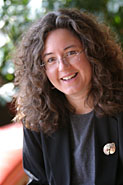Psycholinguistics: Studying speech processes
Psycholinguistics: Studying speech processes McGill University
User Tools (skip):
Psycholinguistics: studying speech processes
Psychology professor Debra Titone's research is breaking ground in determining the key parts of the human brain that are involved in the relatively new field of psycholinguistics - the study of how people understand and use language. She aims to determine how the human brain processes speech by comparing language processing in non-schizophrenic and schizophrenic people. Most people use contextual clues, but many schizophrenics have difficulty with this. For example, the word "pen" has several meanings. The dominant association with this word is a writing tool, and the less frequently associated meaning is an animal enclosure. In her work, Titone has found that schizophrenics can only understand the more common usage of such multiple meaning words, regardless of the context.

Professor Debra Titone
Owen Egan
Titone's latest project focuses on figurative language. Schizophrenics are generally capable of producing and understanding language very well, however figurative language poses problems. For instance, the figurative proverb, 'a rolling stone gathers no moss,' has both literal and idiomatic meanings. Schizophrenics always interpret this type of expression literally. As Titone further explains, "There are hundreds of different idioms, and some employ metaphors that have no plausible meaning, such as, 'paying through the nose'." Interestingly, schizophrenics have no difficulty understanding expressions with only metaphorical meanings, but they become confused when an expression has multiple meanings. Titone has discovered that, different areas of a schizophrenic's brain are involved when processing idioms with both literal and metaphorical meanings. She plans to compare the brain activity of schizophrenic and non-schizophrenic people to determine how this processing occurs.
Titone will employ EEG, (electroencephalography) to measure brain waves of subjects as they process spoken language. "I will compare how brain waves vary for the processing of different idioms in non-schizophrenic people," Titone explains, "then examine the same phenomenon in schizophrenic patients."
Titone looks forward to moving into her new research space - the lab of her dreams, she says. With NSERC and NARSAD grants, a Canada Research Chair Award and a recent Canadian Foundation for Innovation award, Titone is acquiring all the new equipment she needs, such as a new EEG system. The old system used electrodes that required scraping the study participant's scalp in order to receive a clear signal. This inconvenient, if not painful, procedure had the potential to drive away study participants, but new amplifier technology no longer requires this, which is important to Titone. "I want participants to leave feeling good, so that they are more likely to return," she says.
Titone is excited about the potential for study within the bilingual community in Montreal. She may translate her materials into French in order to study both languages. Titone explains that, "Some idioms are common across both languages, for example 'to play with fire'." Using such common idioms, she can explore code-switching, the technical name for the way that fluently bilingual people switch easily between two languages in the course of conversation. She points out, "other than Montreal, where else in the world will you find such a critical mass of bilingual schizophrenic patients?"
McGill's SPARK program (Students Promoting Awareness of Research Knowledge) is funded by NSERC and run by the Faculty of Education, VP Research Office and the University Relations Office. See www.spark.mcgill.ca for more information and articles.
